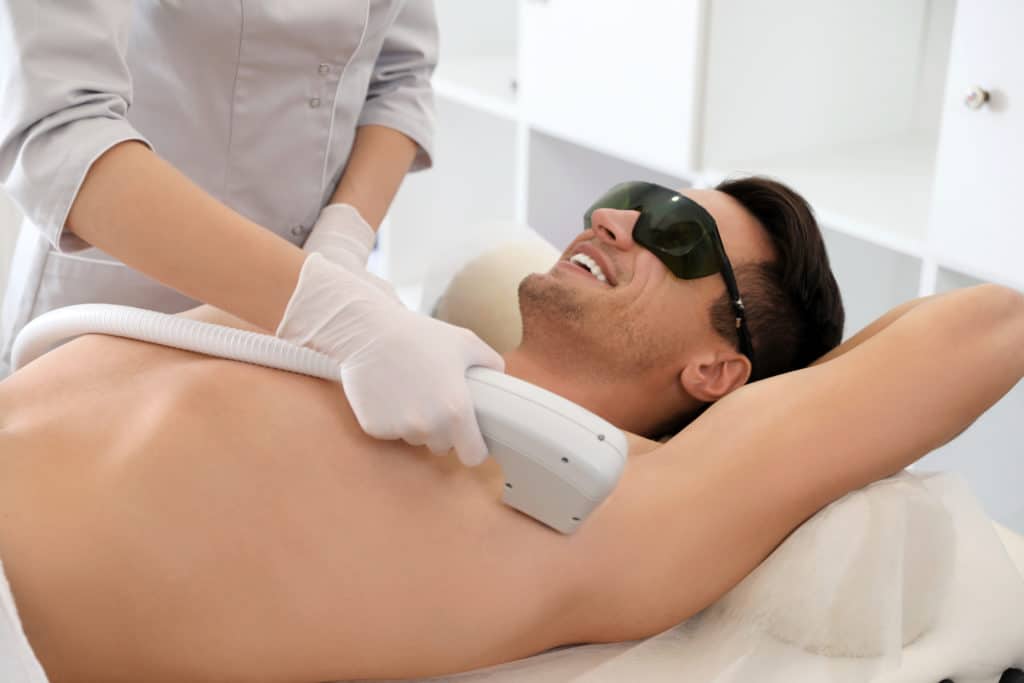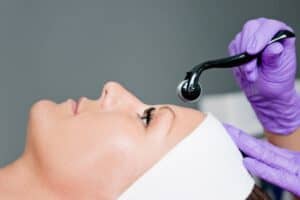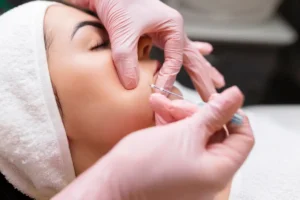
Laser treatments are now more popular due to their enhanced safety and effectiveness from technological progress. Those seeking to eliminate skin imperfections and attain a radiant glow may find their solution in these procedures. The advancements in technology have made laser services a top choice for skin rejuvenation.
What is Laser Treatment?
A laser is a concentrated beam of light that is used in medical laser treatments to remove or treat various illnesses or physical flaws in the body. In fact, “Laser” stands for “Light Amplification by Stimulated Emission of Radiation.”
When applied to the skin or other body parts, the laser light can target specific structures, such as pigments, blood vessels, or hair follicles, without damaging surrounding tissues. Depending on its purpose, laser treatment can be used to reduce wrinkles, eliminate scars, remove tattoos, treat skin discoloration, and even for medical purposes like eye surgeries or removing tumors.
.
Types of Laser Services
Laser services encompass a wide array of treatments, ranging from cosmetic enhancements to medical applications. Here are some of the most common types of laser services:
Ablative Lasers
These lasers promote the growth of new skin by removing the top layer of skin. Common types include:
- CO2 Lasers: Used for treating warts, scars, and deep wrinkles.
- Erbium Lasers: For finer lines and wrinkles, along with other minor skin irregularities.
Non-ablative Lasers
Instead of removing skin layers, these lasers work underneath the skin surface. They’re often used for collagen production. Examples include:
- Fraxel Laser: Addresses pigmentation, fine lines, and skin rejuvenation.
- Pulsed Dye Laser: Used for vascular lesions, like birthmarks and spider veins.
Fractional Lasers
These create microscopic “columns” in the skin, which heal rapidly and boost collagen production. This method combines benefits of both ablative and non-ablative lasers.
Intense Pulsed Light (IPL)
Though not a laser in the technical sense, IPL uses flashes of light to treat sun damage, rosacea, and other skin irregularities.
Hair Removal Lasers
- Alexandrite Laser: Fast and effective for patients with lighter skin tones.
- Diode Laser: Suitable for darker skin types.
- Nd:YAG Laser: Best for all skin types, especially darker skin tones.
Tattoo Removal Lasers:
- Q-switched Lasers: Emit short pulses of energy to break down tattoo pigment. Common ones include Nd:YAG, Alexandrite, and Ruby lasers.
Vascular Lasers
Target blood vessels and are used for conditions like spider veins, broken capillaries, and certain birthmarks.
Skin Tightening Lasers
Stimulate collagen beneath the skin’s surface, promoting tightening and elasticity.
Eye Surgery Lasers:
- Excimer Lasers: Used in LASIK surgery to reshape the cornea.
Laser Treatments for Onychomycosis
Aimed at treating fungal nail infections.
Photodynamic Therapy (PDT)
Used in combination with a photosensitizing drug to treat certain cancers and acne.
Low-level Laser Therapy (LLLT)
Also known as cold laser therapy, it’s used for pain management, wound healing, and inflammatory conditions.
This is not an exhaustive list but provides an overview of some of the most common laser services available today. As technology advances, the range and efficacy of laser treatments will likely expand.
Benefits of Laser Services
Laser services offer numerous benefits across cosmetic, medical, and surgical fields. Here are some of the key advantages:
- Precision: Lasers can target specific pigments or structures in the skin, allowing professionals to treat precise areas without damaging surrounding tissue.
- Minimal Invasiveness: Many laser treatments are minimally invasive, reducing the risk of infection and promoting quicker recovery compared to traditional surgeries.
- Reduction in Scarring: Because of their precision and the fact that they often work at a cellular level, lasers typically cause less scarring than other methods.
- Reduced Signs of Aging: Laser treatments can diminish wrinkles, fine lines, and age spots, leading to more youthful skin.
- Skin Rejuvenation: They can improve skin tone, texture, and elasticity, giving the skin a refreshed and revitalized appearance.
- Treatment of Skin Conditions: Lasers are effective in addressing various skin conditions like rosacea, spider veins, birthmarks, and acne scars.
- Hair Removal: Laser hair removal offers longer-lasting results than many traditional methods like waxing or shaving.
- Tattoo Removal: Depending on the ink’s depth and color, lasers can fade or completely remove tattoos.
- Reduced Bleeding: In surgical applications, the laser can coagulate blood vessels, leading to less bleeding during procedures.
- Faster Recovery: Many laser procedures have shorter recovery times, allowing patients to get back to their regular routines more quickly.
- Decreased Pain: Some laser treatments are virtually painless or only cause mild discomfort, negating the need for anesthesia.
- Versatility: Lasers can be adjusted in terms of depth and intensity, making them suitable for a wide range of skin types and concerns.
- Permanent or Long-lasting Results: Procedures like laser hair removal or certain skin treatments can offer permanent or long-lasting results after a series of sessions.
- Reduced Risk of Infections: The non-invasive nature of many laser procedures means fewer open wounds and, consequently, a reduced risk of post-procedural infections.
- Eye Surgeries: Lasers have revolutionized eye surgeries like LASIK, providing a blade-free alternative that can correct vision with high precision.
Before the Procedure
- Consultation: Always start with a consultation to determine the best treatment for your skin type and concerns.
- Avoid the Sun: Risks can grow with excessive sun exposure. Use SPF on your skin and stay out of the sun weeks before the surgery.
- Skip Certain Products: Avoid retinoids, and certain medications that can increase skin sensitivity.
Post-procedure Care
- Redness and Swelling: Common side effects, but they usually subside within a few days.
- Sun Protection: The skin will be more sensitive to the sun, so diligent sun protection is vital.
- Hydrate and Moisturize: Helps the skin heal and prevents dryness.
- Avoid Harsh Products: Your skin will be sensitive, so opt for gentle skincare products.
Safety and Considerations
When considering laser services, it’s necessary to understand the safety precautions and considerations associated with these treatments to make sure the best results and avoid complications. Here’s a rundown:
Safety:
- Qualified Practitioner: Always ensure the procedure is conducted by a trained and licensed professional. Check their credentials and track record.
- Test Patch: To make sure there are no negative responses, some clinics will apply a test patch, especially for procedures like laser hair removal.
- Eye Protection: Lasers can be harmful to the eyes, so always wear appropriate eye protection during procedures.
- Sterilized Equipment: Ensure that the equipment used is well-maintained and sterilized to avoid infections.
- Limit Sun Exposure: Sunburned or recently tanned skin can react differently to lasers. It’s generally recommended to avoid excessive sun exposure before and after treatments.
- Follow Pre- and Post-care Instructions: These guidelines help minimize potential side effects and enhance treatment efficacy.
Considerations:
- Skin Type and Color: Not all lasers are suitable for all skin types. Some lasers might increase the risk of hyperpigmentation in darker skin tones, while others may be less effective on lighter skin.
- Type of Laser: There are different lasers for different purposes (e.g., ablative vs. non-ablative). Understanding the kind of laser being used will help set expectations.
- Cost: Laser treatments can be expensive, especially since some require multiple sessions. It’s essential to consider the overall cost before starting.
- Expected Results: Understand what results you can realistically expect and how many sessions might be needed to achieve them.
- Potential Side Effects: Redness, swelling, and soreness are examples of frequent adverse effects. More severe side effects, although rare, could include burns, scarring, and unwanted pigment changes.
- Downtime: Some laser treatments might require downtime, where you’ll need to stay out of the sun or take a few days off work.
- Underlying Health Conditions: If you have specific health conditions or take certain medications, they might affect how your skin reacts to laser treatment. Always disclose your full medical history to the practitioner.
- Alternative Options: Always consider if there are alternative treatments that might be more suitable or effective for your specific needs.
- Long-term Maintenance: Some treatments, like laser hair removal, may require touch-up sessions over the years.
- Immediate Aftercare: Post-procedure, the skin might be more sensitive. It’s usually advised to avoid harsh skincare products, excessive sun, and activities like swimming or intensive exercise for a specified period.
While laser treatments can offer significant benefits, it’s crucial to approach them with an understanding of their safety and other considerations. Do thorough research and consult with professionals to make informed decisions.
The Bottom Line
Laser services offer a promising avenue for skin rejuvenation and the treatment of various skin concerns. At Torstveit Medical Aesthetics, we provide a range of laser services, including the BBL® Hero™ and MOXI® treatments, specifically designed to enhance the skin’s appearance and address various cosmetic concerns. Embrace the power of laser treatments: where cutting-edge technology meets timeless beauty!




